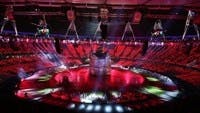GE’s role
GE was keen to emphasize its role as a key supplier for the London 2012 Games, including lighting for some of the most recognizable fixtures and venues.
GE Lighting said that it has supplied 14,000 lamps for London’s 80,000-seat Olympic Stadium, as well as supplying Odyssey luminaires and ceramic metal halide (CMH) Streetwise lamps to ensure the highest levels of security within the main visitor areas in the Olympic Parks.
Also within the main Park, GE Lighting supplied 25,000 Tetra PowerMAX LED modules and Tetra LED drivers for night-time orientation lighting.
At the 15,000-capacity Olympic Hockey Centre, GE supplied specialist sports floodlights in the form of its Euroflood 2000, which has been designed with an integrated ballast compartment for high-pressure sodium (HPS) and metal halide (MH) lamps up to 600W.
Other suppliers
Philips also supplied lighting schemes that enabled TV broadcasting from the main venues, including the Olympic stadium, the Aquatic Centre and the Velodrome. Lessons learned from these installations are summarized in a document by Philips on the Olympics Learning Legacy website (search “lighting” at http://learninglegacy.london2012.com).
Despite a commitment to maximize the use of sustainable technologies, the London 2012 organizers were not able to specify LED lighting for many of the key tasks, including the main lighting schemes for the Olympic Stadium and other major venues. We’ll see whether LEDs have an even bigger impact at the games in Rio de Janeiro in 2016.









